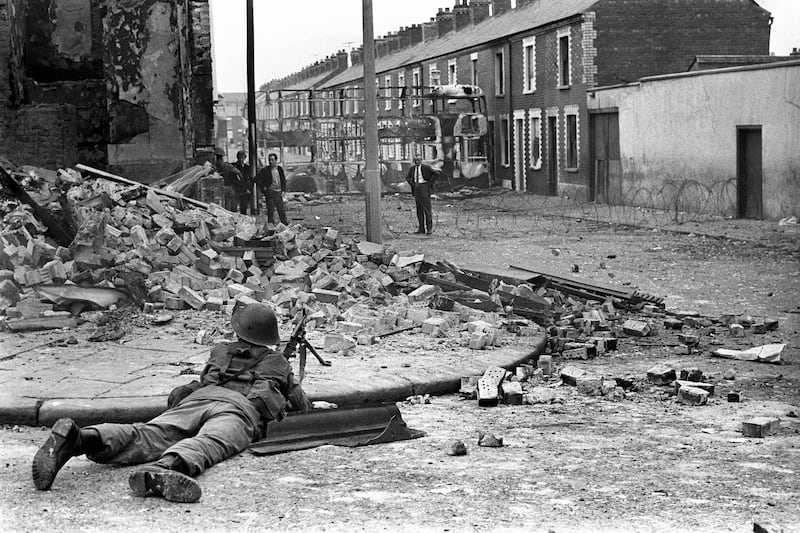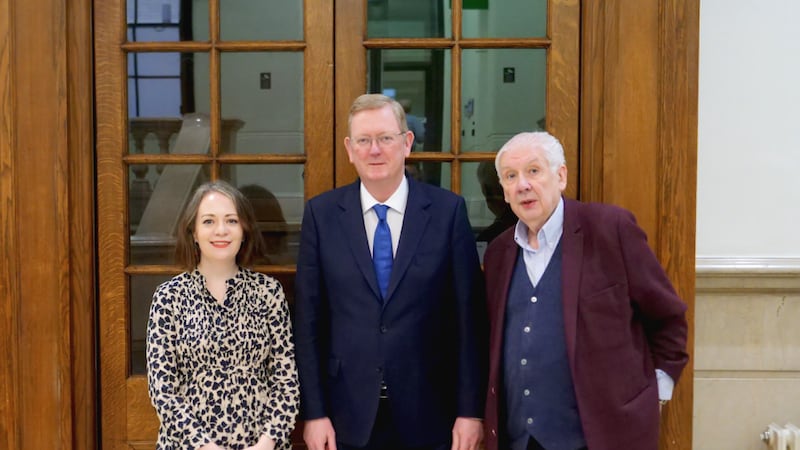The Secretary of State’s recent announcement of the formation of an expert advisory panel to support the work of a public history of British policy during the Northern Ireland conflict has attracted some attention.
As members of the expert advisory panel appointed to support this research, we acknowledge the deep anger and grief caused by the violence and divisions of the past. It has long been recognised that dealing with Northern Ireland’s past demands a wide range of initiatives. Here we clarify what is and what is not within the scope of this project.
The first thing to note is that this project is focussed specifically on British government policy towards Northern Ireland during the conflict and the peace process. It is neither an inquiry into breaches of human rights – a properly legal and judicial task – nor a full history of the conflict, which would need to draw on a much wider range of sources and disciplinary perspectives.

Additionally, this project is not established via the Legacy Act, which includes provision for a range of other academic research initiatives, including an oral history strand, an academic report arising from the findings and workings of the Independent Commission for Information Recovery and Reconciliation, and a major funding call via the Arts and Humanities Research Council (AHRC) to support new research exploring various aspects of the conflict. This project, although separate and limited, is nonetheless historically very significant.
The historians who will be appointed by the panel to undertake this task will undoubtedly examine the patterns by which policy is made and practices accepted or legitimated, exploring the nodes of decision-making within the complexities of the state structures. For example, they may explore the relationship and processes of decision-making between successive prime ministers, the Ministry of Defence and the armed forces.
- No historian should have anything to do with Britain’s ‘independent history’ of the Troubles – Cormac MooreOpens in new window
- Academics granted access to British archives ahead of project to write ‘Public History’ of the TroublesOpens in new window
- Critics question British government’s ‘Public history’ of the Troubles projectOpens in new window
How did social and economic issues intersect with political and security matters throughout the conflict? What was the mix of strategy, intent, and habit that led to policy outcomes at specific historical junctures? The project will also inevitably address issues such as collusion, the use of informers, and allegations of a ‘dirty war’. Addressing all issues relating to British policy, we believe, is important for understanding the past in Northern Ireland.
Secondly, the term ‘public history’ is taken directly from the recommendations of the Pilling Report into the official history programme. Sir Joseph Pilling noted that the title of official history ‘suggests to some that the government determines the content of the books, including any judgments expressed in them, and that it is therefore propaganda’. This was, he observed, ‘not true and had never been true’.
Pilling recognised that ‘public history’ was the best (albeit imperfect) alternative he could find, insofar as it reflected a further recommendation of the report that any historians commissioned should seek to engage the public, by considering appropriate and up-to-date publication plans, and by presenting their work at conferences and other academic events.

Thirdly, we wish to clarify the remit of this advisory panel. As an initial step, our role is to ensure a transparent and rigorous recruitment process for up to five historians to undertake this work over a period of five years. This represents 25 years of academic time in total, and will allow for the major undertaking such a project demands.
The advertisement will be published in due course, and we encourage all qualified researchers, at all career stages, to consider applying. We will then provide support and guidance wherever we can, including in helping to engage the academic community and the wider public in the project as it develops. It is our intent to bring this project into dialogue with colleagues from a wide range of academic and disciplinary perspectives – including new research to be funded through the AHRC. We also intend to engage with similar histories of contested and complex pasts in other countries, and learn from experiences there.
Finally, questions have been raised about access to sources, and many commentators have rightly noted the frustrations of redacted and closed documents in the state archives. There are also the ‘unknown unknowns’ of what has been retained in government departments.

The principal feature of the public/official history series is that commissioned historians have full and unfettered access to all materials, including closed and redacted files, and including those not yet transferred to the state archives. We do not underestimate the challenges associated with this, and it is our intention to ensure that access is truly unfettered, and that appropriate cooperation is forthcoming from across the UK government.
It is understandable that a project such as this, in the context of the Northern Ireland conflict, should attract critical attention. We have no illusions about how difficult an undertaking this is, and we recognise that many people have reservations. For our part, we feel that, under the conditions of transparency set out in our terms of reference, it is worth engaging with this process, to allow historians an unprecedented opportunity to access otherwise closed materials which may never be released.
We have no illusions about how difficult an undertaking this is, and we recognise that many people have reservations. For our part, we feel that, under the conditions of transparency set out in our terms of reference, it is worth engaging with this process, to allow historians an unprecedented opportunity to access otherwise closed materials which may never be released
We note that the Pilling Report describes the principal purpose of the former official history programme as allowing for accountability in assessing how senior office-holders and other policymakers discharged their responsibilities to the country. This theme of accountability is a further guiding principle which will shape this project. If we conclude that there has been an irreconcilable deviation from the terms of reference, or other serious political interference in core scholarly values and judgements, we will say so clearly and publicly.
The professional and independent analysis of the appointed historians will help to inform scholarship on the Troubles, and future researchers can build on, or revise, their findings in due course. We welcome all constructive engagement, both from the academic community and the wider public, and are open to suggestions to make the project more robust.


